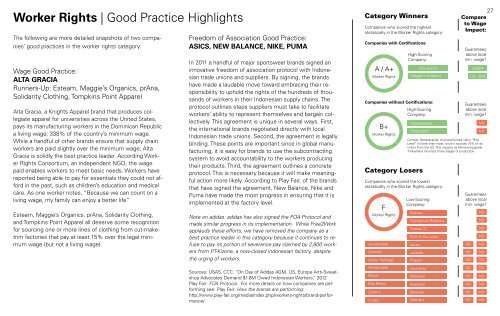APPAREL INDUSTRY TRENDS - Free2Work
APPAREL INDUSTRY TRENDS - Free2Work
APPAREL INDUSTRY TRENDS - Free2Work
Create successful ePaper yourself
Turn your PDF publications into a flip-book with our unique Google optimized e-Paper software.
Worker Rights | Good Practice Highlights<br />
The following are more detailed snapshots of two compa-<br />
nies’ good practices in the worker rights category:<br />
Wage Good Practice:<br />
ALTA GRACIA<br />
Runners-Up: Esteam, Maggie’s Organics, prAna,<br />
Solidarity Clothing, Tompkins Point Apparel<br />
Alta Gracia, a Knights Apparel brand that produces collegiate<br />
apparel for universities across the United States,<br />
pays its manufacturing workers in the Dominican Republic<br />
a living wage: 338% of the country’s minimum wage.<br />
While a handful of other brands ensure that supply chain<br />
workers are paid slightly over the minimum wage, Alta<br />
Gracia is solidly the best practice leader. According Worker<br />
Rights Consortium, an independent NGO, the wage<br />
paid enables workers to meet basic needs. Workers have<br />
reported being able to pay for essentials they could not afford<br />
in the past, such as children’s education and medical<br />
care. As one worker notes, “Because we can count on a<br />
living wage, my family can enjoy a better life.”<br />
Esteam, Maggie’s Organics, prAna, Solidarity Clothing,<br />
and Tompkins Point Apparel all deserve some recognition<br />
for sourcing one or more lines of clothing from cut-maketrim<br />
factories that pay at least 15% over the legal minimum<br />
wage (but not a living wage).<br />
Freedom of Association Good Practice:<br />
ASICS, NEW BALANCE, NIKE, PUMA<br />
In 2011 a handful of major sportswear brands signed an<br />
innovative freedom of association protocol with Indonesian<br />
trade unions and suppliers. By signing, the brands<br />
have made a laudable move toward embracing their responsibility<br />
to uphold the rights of the hundreds of thousands<br />
of workers in their Indonesian supply chains. The<br />
protocol outlines steps suppliers must take to facilitate<br />
workers’ ability to represent themselves and bargain collectively.<br />
This agreement is unique in several ways. First,<br />
the international brands negotiated directly with local<br />
Indonesian trade unions. Second, the agreement is legally<br />
binding. These points are important since in global manufacturing,<br />
it is easy for brands to use the subcontracting<br />
system to avoid accountability to the workers producing<br />
their products. Third, the agreement outlines a concrete<br />
protocol. This is necessary because it will make meaningful<br />
action more likely. According to Play Fair, of the brands<br />
that have signed the agreement, New Balance, Nike and<br />
Puma have made the most progress in ensuring that it is<br />
implemented at the factory level.<br />
Note on adidas: adidas has also signed the FOA Protocol and<br />
made similar progress in its implementation. While <strong>Free2Work</strong><br />
applauds these efforts, we have removed the company as a<br />
best practice leader in this category because it continues to refuse<br />
to pay its portion of severance pay claimed by 2,800 workers<br />
from PT-Kizone, a now-closed Indonesian factory, despite<br />
the urging of workers.<br />
Sources: USAS, CCC: “On Day of Adidas AGM, US, Europe Anti-Sweatshop<br />
Advocates Demand $1.8M Owed Indonesian Workers,” 2012<br />
Play Fair: FOA Protocol. For more details on how companies are performing<br />
see: Play Fair: How the brands are performing:<br />
http://www.play-fair.org/media/index.php/workers-rights/brand-performance/<br />
Category Winners<br />
Companies who scored the highest<br />
statistically in the Worker Rights category:<br />
Companies with Certifications:<br />
A / A+<br />
Worker Rights<br />
B+<br />
Worker Rights<br />
F<br />
Worker Rights<br />
Aeropostale<br />
Aramark<br />
Armor Holdings<br />
Aeropostale<br />
Blauer<br />
Bob Barker<br />
Carter’s<br />
Cintas<br />
High-Scoring<br />
Company:<br />
Alta Gracia Alta Gracia<br />
Maggie’s Organics<br />
Companies without Certifications:<br />
High-Scoring<br />
Company:<br />
Hanesbrands<br />
Timberland<br />
Category Losers<br />
Companies who scored the lowest<br />
statistically in the Worker Rights category:<br />
Express<br />
Fechheimer Brothers<br />
Forever 21<br />
Fruit of the Loom<br />
Garan<br />
Lacoste<br />
Propper<br />
Quiksilver<br />
Robinson<br />
Skechers<br />
Spiewak<br />
Walmart<br />
27<br />
Compare<br />
to Wage<br />
Impact:<br />
Guarantees<br />
above local<br />
min. wage?<br />
NO<br />
NO<br />
NO<br />
NO<br />
NO<br />
NO<br />
NO<br />
NO<br />
+238%<br />
NO<br />
NO<br />
Context: Hanesbrands’ child and forced l abor “Risk<br />
Level” is lower than most, since it sources 75% of its<br />
cotton from the US. This impacts its Monitoring grade.<br />
Timberland monitors three stages of production.<br />
Low-Scoring<br />
Company:<br />
+10 - 25%<br />
Guarantees<br />
above local<br />
min. wage?<br />
Guarantees<br />
above local<br />
min. wage?<br />
NO<br />
NO<br />
NO<br />
NO<br />
NO<br />
NO<br />
NO<br />
NO<br />
NO<br />
NO<br />
NO<br />
NO


